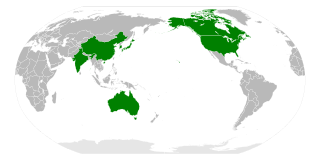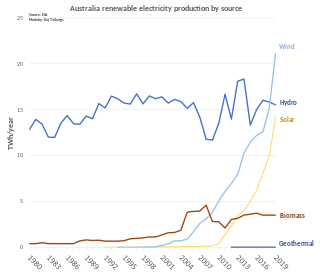Related Research Articles
The United Kingdom's Climate Change Programme was launched in November 2000 by the British government in response to its commitment agreed at the 1992 United Nations Conference on Environment and Development (UNCED). The 2000 programme was updated in March 2006 following a review launched in September 2004.
The Australian Department of the Environment was a department of the Government of Australia that existed between September 2013 and July 2016. The department was charged with responsibility for developing and implementing national policy, programs and legislation to protect and conserve Australia's environment and heritage.

Energy policy is the manner in which a given entity has decided to address issues of energy development including energy conversion, distribution and use as well as reduction of greenhouse gas emissions in order to contribute to climate change mitigation. The attributes of energy policy may include legislation, international treaties, incentives to investment, guidelines for energy conservation, taxation and other public policy techniques. Energy is a core component of modern economies. A functioning economy requires not only labor and capital but also energy, for manufacturing processes, transportation, communication, agriculture, and more. Energy planning is more detailed than energy policy.

The Climate Group is a non-profit organisation that works with businesses and government leaders around the world to address climate change. The Group has programmes focusing on renewable energy and reducing greenhouse gas emissions. Launched in 2004, the organisation operates globally with offices in the UK (headquarters), the United States and India.

The Asia-Pacific Partnership on Clean Development and Climate, also known as APP, was an international, voluntary, public-private partnership among Australia, Canada, India, Japan, the People's Republic of China, South Korea, and the United States announced July 28, 2005 at an Association of South East Asian Nations (ASEAN) Regional Forum meeting and launched on January 12, 2006, at the Partnership's inaugural Ministerial meeting in Sydney. As of 5 April 2011, the Partnership formally concluded although a number of individual projects continue. The conclusion of the APP and cancellation of many of its projects attracted almost no media comment.
"Greenhouse Mafia" is the title of a TV program aired by Australian network ABC on the 13 February 2006 episode of its weekly current affairs program Four Corners. The program says the term greenhouse mafia is the "in house" name used by Australia’s carbon lobby for itself. The program featured former Liberal Party member Guy Pearse and Four Corners host Janine Cohen, while others concerned about the influence exerted by the fossil fuel lobby also participated. The report was based on a thesis Pearse wrote at the Australian National University between 1999 and 2005 regarding the response of Australian business to global warming. According to the program, lobby groups representing the coal, car, oil, and aluminium industries have wielded their power to prevent Australia from reducing its greenhouse gas emissions, which were already among the highest per capita in the world in 1990.

The energy policy of the European Union focuses on energy security, sustainability, and integrating the energy markets of member states. An increasingly important part of it is climate policy. A key energy policy adopted in 2009 is the 20/20/20 objectives, binding for all EU Member States. The target involved increasing the share of renewable energy in its final energy use to 20%, reduce greenhouse gases by 20% and increase energy efficiency by 20%. After this target was met, new targets for 2030 were set at a 55% reduction of greenhouse gas emissions by 2030 as part of the European Green Deal. After the Russian invasion of Ukraine, the EU's energy policy turned more towards energy security in their REPowerEU policy package, which boosts both renewable deployment and fossil fuel infrastructure for alternative suppliers.

The energy policy of Australia is subject to the regulatory and fiscal influence of all three levels of government in Australia, although only the State and Federal levels determine policy for primary industries such as coal. Federal policies for energy in Australia continue to support the coal mining and natural gas industries through subsidies for fossil fuel use and production. Australia is the 10th most coal-dependent country in the world. Coal and natural gas, along with oil-based products, are currently the primary sources of Australian energy usage and the coal industry produces over 30% of Australia's total greenhouse gas emissions. In 2018 Australia was the 8th highest emitter of greenhouse gases per capita in the world.

Renewable energy in Australia includes wind power, hydroelectricity, solar photovoltaics, heat pumps, geothermal, wave and solar thermal energy.

The Carbon Pollution Reduction Scheme was a cap-and-trade emissions trading scheme for anthropogenic greenhouse gases proposed by the Rudd government, as part of its climate change policy, which had been due to commence in Australia in 2010. It marked a major change in the energy policy of Australia. The policy began to be formulated in April 2007, when the federal Labor Party was in Opposition and the six Labor-controlled states commissioned an independent review on energy policy, the Garnaut Climate Change Review, which published a number of reports. After Labor won the 2007 federal election and formed government, it published a Green Paper on climate change for discussion and comment. The Federal Treasury then modelled some of the financial and economic impacts of the proposed CPRS scheme.

The Minister for Climate Change and Energy is a portfolio in the Government of Australia. The current Minister is Chris Bowen. The minister administers his or her portfolios through the Department of Climate Change, Energy, the Environment and Water.
Greenhouse gas emissions by Australia totalled 533 million tonnes CO2-equivalent based on greenhouse gas national inventory report data for 2019; representing per capita CO2e emissions of 21 tons, three times the global average. Coal was responsible for 30% of emissions. The national Greenhouse Gas Inventory estimates for the year to March 2021 were 494.2 million tonnes, which is 27.8 million tonnes, or 5.3%, lower than the previous year. It is 20.8% lower than in 2005. According to the government, the result reflects the decrease in transport emissions due to COVID-19 pandemic restrictions, reduced fugitive emissions, and reductions in emissions from electricity; however, there were increased greenhouse gas emissions from the land and agriculture sectors.
Australia is well placed to harness solar thermal energy. Solar thermal energy is used in three main ways: solar hot water heating, production of steam for electricity generation and space heating through building design.

The climate change policy of the United States has major impacts on global climate change and global climate change mitigation. This is because the United States is the second largest emitter of greenhouse gasses in the world after China, and is among the countries with the highest greenhouse gas emissions per person in the world. In total, the United States has emitted over 400 billion metric tons of greenhouse gasses, more than any country in the world.
The Kyoto Protocol was an international treaty which extended the 1992 United Nations Framework Convention on Climate Change. A number of governments across the world took a variety of actions.
A carbon pricing scheme in Australia was introduced by the Gillard Labor minority government in 2011 as the Clean Energy Act 2011 which came into effect on 1 July 2012. Emissions from companies subject to the scheme dropped 7% upon its introduction. As a result of being in place for such a short time, and because the then Opposition leader Tony Abbott indicated he intended to repeal "the carbon tax", regulated organizations responded rather weakly, with very few investments in emissions reductions being made. The scheme was repealed on 17 July 2014, backdated to 1 July 2014. In its place the Abbott government set up the Emission Reduction Fund in December 2014. Emissions thereafter resumed their growth evident before the tax.

Co-benefits of climate change mitigation are the benefits related to mitigation measures which reduce greenhouse gas emissions or enhance carbon sinks.
The Department of the Environment and Energy (DEE) was an Australian government department in existence between 2016 and 2020.
The history of climate change policy and politics refers to the continuing history of political actions, policies, trends, controversies and activist efforts as they pertain to the issue of global warming and other environmental anomalies. Dryzek, Norgaard, and Schlosberg suggest that critical reflection on the history of climate policy is necessary because it provides 'ways to think about one of the most difficult issues we human beings have brought upon ourselves in our short life on the planet’.
Green recovery packages are proposed environmental, regulatory, and fiscal reforms to rebuild prosperity in the wake of an economic crisis, such as the COVID-19 pandemic or the Global Financial Crisis (GFC). They pertain to fiscal measures that intend to recover economic growth while also positively benefitting the environment, including measures for renewable energy, efficient energy use, nature-based solutions, sustainable transport, green innovation and green jobs, amongst others.
References
- 1 2 CA 9189: The Department of Climate Change, National Archives of Australia, retrieved 9 December 2013
- ↑ "Administrative Arrangement Order of 3 December 2007" (PDF). Government of Australia. 3 December 2007. Archived from the original (PDF) on 28 April 2013.